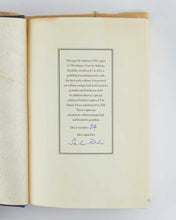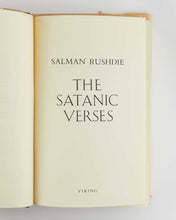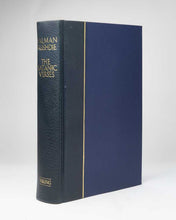
RUSHDIE, Salman. The Satanic Verses. London: Viking Press. 1988.
8vo. Quarter goatskin over navy buckram cloth, ruled in gilt and with gilt lettering to spine and publisher's textured end papers; in the original plain paper publisher's dust wrapper; pp. [xii], 3-546, [iv]; issued with typed paper label to spine; dustwrapper toned, with some larger chips to spine ends, but seldom found at all, and has done an expert job of preserving the boards beneath; fine, internally.
Limited first edition, number 24 of just 100 copies, published simultaneously with the first trade edition, signed by the author.
The Satanic Verses was Rushdie's fourth novel and caused huge controversy when it was initially released due to its depiction of the prophet Muhammad. The title refers to the satanic verses, a group of Quranic verses that refer to three Pagan Meccan goddesses: Allāt, Uzza, and Manāt. The novel employs elements of magic realism interspersed with a sequence of subplots that take the form of intricate dream narratives relayed by the protagonist. American theorist Timothy Brennan would later praise The Satanic Verses as, "the most ambitious novel yet published to deal with the immigrant experience in Britain".
The scandal that ensued surrounding creative censorship was extremely divisive. A year after publication Ruhollah Khomeini, Supreme Leader of Iran, issued a fatwa ordering Muslims to kill Rushdie for blaspheming against Islam. A fatwa cannot be revoked in the Shia Islamic tradition. Pakistan banned the book in 1988, and the importing of the book was forbidden in India. Many translators of The Satanic Verses have suffered serious injury and, in the case of Rushdie's Japanese translator, death. In fact, in 2022, Rushie was himself attacked on stage whilst talking at an event. Subsequent to this stabbing, he lost sight in one eye and the ability to use one hand. Remarking on the extreme controversy surrounding The Satanic Verses, scholar M.D. Fletcher considered the irony, "that some of the major expressions of hostility toward Rushdie came from those about whom and (in some sense) for whom he wrote."
Speaking of his own work, Rushdie has defined his intentions as being, not about Islam at all, but rather a novel concerned with issues as varied as; "migration, metamorphosis, divided selves, love, death, London and Bombay". The complex controversy surrounding The Satanic Verses continues to impact. It is an influential novel which explores, amongst many other subjects, the disillusionment suffered by characters in between identification with competing cultures. It is a novel which, through unusual surreal depiction, highlights identity crises whilst binding its text in powerful parallel stories with roots in diverse religious history.
#2120337







